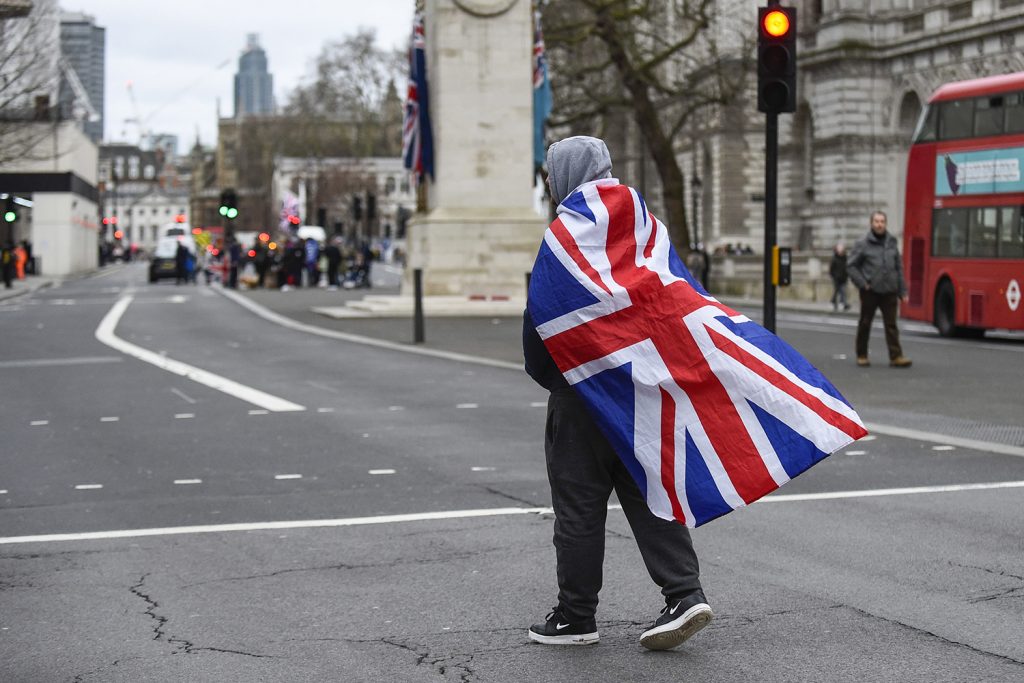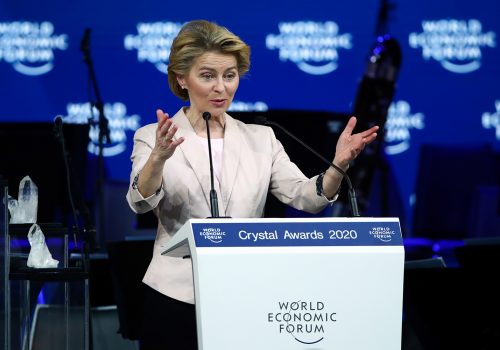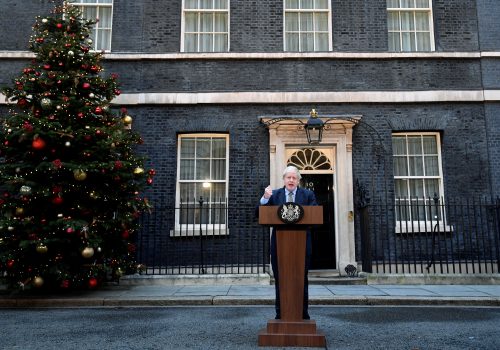After nearly forty-seven years, the Union Jack was lowered from European Union buildings on the night of January 31, as the United Kingdom officially left the European Union. Following a close referendum in 2016, UK and European officials engaged in drawn-out negotiations about the way Britain would leave the bloc and what future relationship London would have with its European neighbors. Despite the official exit of the United Kingdom, many of these issues remain unresolved, as both sides must now focus on completing a free trade agreement and standardizing their cooperation in other policy areas, such as security and defense, foreign affairs, energy, and technology. For now, the United Kingdom will continue to follow EU rules and regulations, until a permanent economic relationship is reached.
Discussions about Brexit were even more contentious within the United Kingdom, as Parliament grappled with the proper course to take in achieving Brexit. Prime Minister Theresa May was unable to secure her original Withdrawal Agreement, which forced her to resign with Prime Minister Boris Johnson succeeding her. Only a general election was able to break the gridlock, but numerous questions still remain, including the status of the border between the Republic of Ireland and Northern Ireland, and the fate of Scotland, which voted to remain in the EU and has since a rise in popularity of the pro-independence Scottish National Party (SNP).
With Brexit now technically achieved, the remaining questions about the future UK-EU relationship will continue to dominate both sides in the years to come. Atlantic Council experts offered their response to the formal exit of the United Kingdom from the European Union and what lies ahead for both the UK and Europe:
Benjamin Haddad, director of the Atlantic Council’s Future Europe Initiative:
For Paris: An opportunity and a warning sign
“Two days after the United Kingdom officially left the European Union, French President Emmanuel Macron was visiting Poland for the first time in his presidency in a bid to warm strained ties with Central and Eastern European countries. The visit’s timing is probably a coincidence, but it highlights the need for Paris to build new partnerships within the EU. A need but also an opportunity as many smaller countries might seek to balance their relationships with Berlin.
“It is a paradoxical moment for France. The United Kingdom’s initial application to the European Community was delayed because of General Charles de Gaulle’s veto. De Gaulle thought London would never be a full European member, always looking to the other side of the Atlantic, and the UK had to wait for his successor, Georges Pompidou, to join the Community. The two countries were often at odds: on the 1980s rebate controversy, Iraq, or on the early developments of European defense that the UK saw as competing with NATO. And yet, London was also seen as a useful counterweight to Berlin for France, especially as it managed to shape compromises on defense (Saint Malo, Lancaster House Treaties) with the other most important European military player.
“In a statement, Macron called Brexit “sad” and a “warning sign,” calling on the EU to avoid any sense of complacency and reform to adopt more democratic and efficient decision making mechanisms. The French president’s agenda for EU reform, a bid for “European sovereignty,” encompassing tougher immigration policies and a more ambitious trade and defense agenda, is a key priority of his presidency. This ambition led him to adopt a hawkish position against further extension of Brexit deadlines, which he saw as a distraction from urgent reforms, a firm position he ironically shared with Boris Johnson.
“Now that Brexit is effective, France has an interest in keeping the UK close, especially on defense and security developments, a priority for Paris for Europe to matter on the international stage. While PESCO and the European Defense Fund are exclusively EU instruments (and the status of the UK as a third party in EDF-funded projects will be debated), Macron has pushed forward other broader initiatives such as the European Intervention Initiative or concepts like the European Security Council that would include the UK.”
Frances Burwell, distinguished fellow in the Atlantic Council’s Future Europe Initiative:
“Walking past Parliament Square and Whitehall this afternoon, with seven hours to go before Brexit, there is the emerging feeling of a street party. Union Jacks everywhere, a stage with music, families with children, and lots of celebratory yells, along with mild but cloudy weather. But interviews here in London make clear that this country is leaving the European Union with little understanding of what it wants and no serious discussion about the costs of different options.
“For the moment, nothing will change: between now and December 2020, the UK and the EU will negotiate an agreement on trade, as well as other elements of their future relationship. Since the 2016 referendum, no British government has put forward a clear vision of what those agreements might look like. Prime Minister Boris Johnson has established that the UK will leave the Customs Union, but by letting Northern Ireland stay in the customs union, he has established a new border, with much uncertainty about how it will work. But what will be the tariff levels—if any—for goods shipped between the EU and the UK? What will be the scope of any agreement, will it include services, a major part of cross-Channel commerce? How much will the UK diverge from the EU in terms of regulations on goods and services? Johnson’s government talks about having the freedom to diverge, but with no mention that this may complicate whether British goods are acceptable in the EU and what tariffs may apply.
“The situation is further complicated by the possibility of a trade agreement between Britain and the United States—said to be a priority of both Johnson and US President Donald J.Trump. In recent days, however, the Johnson government seems finally to have realized that the United States will drive a hard bargain, aiming for a deal that moves Britain away from EU regulations on genetically modified foodstuffs, chlorinated washes for poultry, adherence to geographical name brands for food, and providing US pharmaceutical companies better access to the National Health Service. The UK decision on January 28 to allow Huawei partial access to their telecoms network can be seen as an attempt to lay down a firm British line in advance of those negotiations, or as an example of British naivete on China.
“Regardless of the final shape of the UK-EU and US-UK trade negotiations, we already see the impact of Britain’s disengagement from the European Union and its trade policy. The new European Commission has raised the prospect of a more activist industrial policy and greater development of trade defense measures. It is too early to tell if these ideas will become reality, but the mere fact that they are being discussed—and as a counterbalance to the United States—demonstrates the lack of British moderating influence and commitment to open economies.
“The British people [now] embark on a new phase of their relationship with both Europe and the United States. Whether it will be a success is far from clear. Right now, as Brexit approaches, there is little clarity about what the British government wants or the likely impact of its choices. For the sake of the British people and economy, that clarity must come very soon.”
Olivier-Rémy Bel, visiting fellow at the Atlantic Council:
“Ironically, Brexit has been credited, to some extent, for the current reinvigoration of EU defense efforts, either because it acted as a wake-up call or because Britain stopped putting on the brakes. Yet as Brexit is unfolding—sometimes with a teary eye in Brussels—the United Kingdom and the European Union should now devise a defense and foreign policy relationship that is as close as possible.
“Britain and the EU will continue to live in the same strategic environment, sharing threats ranging from the persistence of terrorism to the rise of authoritarian regimes. ISIS has lost its territorial caliphate but the fight is not over—especially if the Sahel falls to growing unrest. Russia will continue to act boldly, as it did from Ukraine to Salisbury. Indeed, its recent forays in Libya have a whiff of Syria. China—the EU’s “systemic rival” —will pose a growing challenge, from trade to technology.
“Geography aside, the United Kingdom will remain enmeshed in European security through a web of ties, the first being its membership in NATO. Britain’s forces will continue to work with Denmark, Estonia, Finland, Latvia, Lithuania, Netherlands, Norway, and Sweden through the Joint Expeditionary Force and to partner closely with France thanks to the Combined Joint Expeditionary Force. The UK is still a very active member of the European Intervention Initiative. Defense industrial bonds will also remain strong, from the highly integrated missile-maker MBDA to joint participation in OCCAR (Organization for Joint Armament Cooperation, in charge, amongst other, of the A400M transport aircraft).
“Sorting out operational matters might be the easiest part of the future EU-UK relationship. Arrangements have been made for the UK’s departure from the EU Common Security and Defence Policy (CSDP), such as moving the Headquarters of Operation Atalanta, fighting piracy off the Horn of Africa, from Northwood to Spain. Non-EU member states already contribute to CSDP operations through Framework Participation Agreements. For instance, Georgia provides force protection to the mission in Central Africa. Thus, devising arrangements for the UK should not prove too problematic, especially given Britain’s historically low contribution, amounting to roughly 2.3% of personnel.
“The crux of the matter will be the political level. Finding mechanisms that ensure as strong as possible a degree of convergence on issues of mutual interest, that enable joint work on topics ranging from sanctions targeting to UN Security Council resolutions, while at the same time respecting each other’s independent decision-making process will be a challenge. Flexible format such the E3—Germany, France, and the UK—can be part of the solution. The recent triggering of the Joint Comprehensive Plan of Action’s (JCPOA) dispute resolution mechanism highlighted its relevance. In a more formal way, Macron’s proposal of a European Security Council with the UK on board could be an fruitful avenue to explore.
“Finally, the tricky question will be that of devising means to associate the UK to the nascent EU defense capability and industrial policy tools, such as the European Defense Fund, or to existing projects such as the Galileo [satellite navigation system.] Genuinely shared industrial interest will be pitted against intellectual property and security concerns.
“There is currently a relatively strong consensus on both sides of the Channel on the need for a deep foreign policy and defense relationship. That goodwill must be protected from potential spillovers from tougher negotiations in more adversarial sectors. Maintaining trust throughout the process will be the key. That requires zooming out a little: in a world of rising authoritarian powers challenging the rules-based international order, the UK and the EU are part of the same family.”
Sophia Besch, nonresident senior fellow in the Atlantic Council’s Future Europe Initiative
“Brexit has consequences for Berlin’s own leadership position in the union. On the one hand, the UK’s departure means that France and Germany have no choice but to cooperate closely. Thus, one obvious risk of Brexit for Germany is the resentment of other EU member states over Franco-German dominance of the EU. However, both the Merkel and the Macron government have found it almost impossible to agree on EU policy in recent years, a state of affairs that has been exacerbated by the British leaving.
“The UK has in the past been a balancing weight in the EU’s leadership trio. London has often been closely aligned with Berlin over issues like free trade or enlargement, which has recently driven a wedge between Merkel and Macron’s governments. Equally, the British were a partner to France whenever Paris got frustrated with Berlin over defense.
“Germany supports a greater role for the EU in defense policy. Merkel understands the strategic implications of Brexit, of the weakening of the union and the principles it represents on the international stage. But Berlin has not been able to create domestic support for greater defense spending or more military engagement alongside its EU partners. Without the UK’s military and defense industrial expertise and capabilities, the EU will struggle to fulfil its ambitions of strategic sovereignty.
“Berlin is therefore in favor of creating new flexible structures to allow the UK to plug into European foreign and defense policy—potentially through the creation of a European Security Council—and enable UK participation in missions and operations on a case-by-case level. But the participation of British defense industry in cooperative capability projects through Permanent Structure Cooperation (PESCO) or the European defense fund (EDF) will be less straightforward. And in matters of justice and home affairs, Berlin supports the EU‘s demands that the UK would have to accept a strong role for the European Court of Justice, as well as EU rules on data privacy before it could co-operate closely with other member states.
“In terms of the future economic relationship, Berlin would prefer close cooperation with the UK. But even German businesses, which are deeply linked to the EU via supply chains and investment, value the integrity of the single market and the EU more than tariff-free access to the UK market. Thus Berlin, like the European Commission and Paris, takes the position that the priority for the EU has to be the ‘level playing field’: if the British plan to diverge from EU regulations, they cannot be close.
“While Germany is strongly in favor of a close relationship with the UK after Brexit, politically, nothing is more important to Berlin than the stability and integrity of the EU—a project it considers central to its national interest.”
John M. Roberts, nonresident senior fellow in the Atlantic Council’s Eurasia Center and Global Energy Center:
“Britain will continue to maintain security relationships with major European powers, notably France and Germany, but will downplay and publicly disparage any suggestion of a security relationship with the EU. It will have to engage in extensive negotiations with the EU for a post-Brexit trade deal, and this will necessitate a close relationship until the end of 2020. But after that it is quite possible that UK-EU relations in general will be marked more by acrimony than amity.
“In security terms, the emphasis will be on relations with the United States, unless we reach a point where President Trump’s ‘America Only’ policies are seen to be directly damaging to UK interests such as intelligence sharing and military scientific research.
“NATO will pose a key test. If Trump wins re-election and begins an effective disengagement from NATO, the UK will have to think very long and hard about its own security future. Much will depend on how the other major European NATO states react. There is a distinct possibility that the UK will find itself isolated from both the United States and Europe.
“One key question. Britain’s nuclear deterrent depends on US technology. Is there any guarantee that the United States will continue to cooperate with the UK concerning the replacement of the UK’s nuclear-armed Trident submarine fleet if the UK does not fall in line with US requirements for a trade deal?
“But then even this may fall by the wayside if Britain’s post-Brexit future includes Scottish independence and a demand by Scotland’s negotiators on independence for, at least, a strict time-frame for the withdrawal of the UK nuclear fleet from its base at Faslane.”
David A. Wemer is associate director, editorial at the Atlantic Council. Follow him on Twitter @DavidAWemer.
Further reading
Image: LONDON, UK.- Pro-EU supporters gather outside Europe House in central London, Britain, on Jan. 31, 2020. Britain will leave the European Union (EU) on Jan. 31, 2020.



